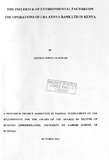| dc.description.abstract | Kenya is faced with a myriad of problems that it needs to address. These include unemployment and poverty, debt burden, foreign exchange deficits and balance of payment problems. Foreign direct investment (FDI) is often cited as a vehicle for development amongst the poorer nations of the world. The Government of Kenya has emphasized on improving the environment for doing business to facilitate private sector and investment activities. However, despite efforts made to improve the business environment, there are still issues that constrain the growth of investment and the country’s competitiveness. Most of these issues touch on political, legal, economic, socio-cultural and technological aspects. The general objective of this study was to assess the influence of various environmental factors on the operations of UBA Kenya Bank Ltd in Kenya.
The study employed a case study as its research design. The primary data source was an interview guide. The respondents for purposes of this study were the corporate level management of UBA Kenya Bank Ltd. Data collected was analysed using content analysis as the study aims to collect data that is qualitative in nature.
On the legal factors, the study concludes it is a great constraint in doing business in Kenya, but in the new dispensation of the new constitution there is hope that taxes and tariffs, and trade laws will be implemented to enhance the business environment. The study concludes that economic factors such as infrastructure and high cost of capital remain serious external environmental challenges to businesses in Kenya. The study finally concludes that those socio-cultural factors which have an influential role on the operations of UBA Kenya were mainly, conflicts, corruption and the highly skewed income distribution. On political factors the study concludes that government direct or indirect intervention has an influence on businesses in an economy. The study identified level of government intervention in the economy and political stability as major factors influencing operations of UBA Kenya.
This research paper recommends for reconsideration of such environmental factors that impose unnecessary constraints on businesses in Kenya. The study further recommends that governments try to encourage investments through formulating and enacting the right policies for the business environment in their countries in order to reach high productivity levels that would guarantee improved living standards. The study further recommends that strategic positioning for UBA and other multinational organizations that have to deal with dynamic and uncertain environments | en_US |

